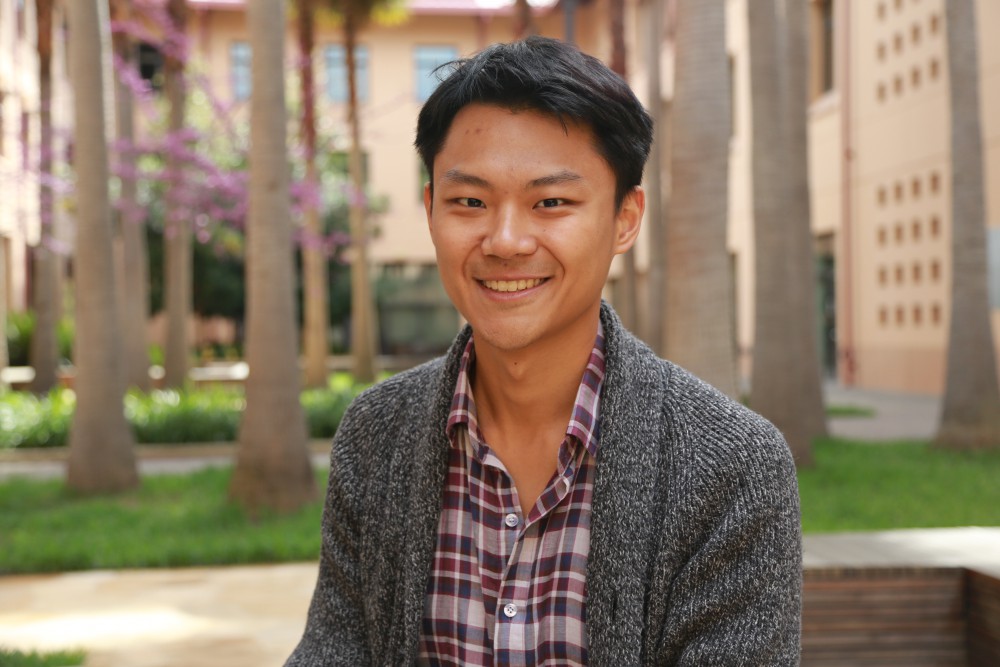The boy had been born with four healthy limbs but by the end of his first year, he had already lost both his arms. Broad, toned shoulders gave him the triangular physique that so many young men craved, as if his upper body were perfectly fitted for a Zhongshan tunic suit – although if he were actually to have worn one, his father would have needed to trim both sleeves off so as to draw less attention to his son’s missing limbs beneath blue and black cloth.
Both his parents had worked as tailors in our humble village near Wuhan, as their own forefathers had done. They had been born during the glorious years of the Long March and the rise of our Communist Party; recently they had enjoyed the fortune of watching our leader Chairman Mao dive into the Yangtze River to swim against ‘the great wind and great waves of the bourgeois’. Oh, how lucky we all had been to witness the launch of our Cultural Revolution! Only two days after the swim, Chairman Mao – may he live for 10,000 years! – returned to the Great Hall of the People in Beijing to arrest that traitor Liu Shaoqi, who died a mere three years later after a too-few number of public beatings at party denunciation meetings.
As a baby, the Swimmer had been ordinary. He cried, as all boys do while they get used to empty stomachs. He was skinny but not overly malnourished. Almost daily he had been breastfed by his mother, until she fell sick from some evil curse which the doctor had called pneumonia and would later sour her milk. For the next year, his father would stitch an extra Zhongshan suit each week to afford the extra cost of cow’s milk for his only son.
Soon the rumour would spread all over the village near Wuhan that the Swimmer’s mother could no longer give birth; for why else would the tailor not have compelled his wife to try again after her illness for another child, one not so accursed?
Still, the story of how the boy lost his arms remains a mystery. Some whispered that it was caused by some fungus stemming from the baby’s long baths in the Yangtze, since the tailor’s shop near the river had also served as their family sleeping quarters. Others say his disease was genetic but to those gossipers, I ask: why did his ailment affect only his arms, and not the rest of his body? All
we know for certain is that when the boy was barely eight months old – and he is truly blessed by the Holy Buddha that he was too young to remember this – his parents took him to Wuhan Children’s Hospital one evening and when they returned, their child no longer had arms. Later, the rumour flooded our village that the father had locked himself inside his workshop for three straight days after returning from the hospital: all so that he could sew a new set of clothes for his boy, none of which bore a single sleeve.
Surely, his mother must have been devastated! First, her son had lost his arms! But then her pneumonia, which had already cost her family a fortune in cow’s milk, began to give her such severe headaches that she could no longer help her husband with his tailor shop; and of course, this only tightened money matters more.
So what to do with a boy with no arms? Sure, he did not need to flip over the pages of old texts written by Li Bai or Du Fu, but also he did not have any hands to feel the fine wrinkles in a piece of fabric or operate a sewing machine. Who would inherit his family’s shop?
Many in the village wondered about this. They would gossip over bowls of beef noodles, making bets about when the tailor might sell his shop on the cheap. I, of course, did none of this and flashed evil eyes when I heard them whisper about the tailor and his armless son; until news spread to my door one night that the tailor’s wife, bed-ridden once more, had breathed her last. And then not even I had any choice but to ponder such business matters.
*
The next morning, a few from our village saw his little body in the Yangtze, thrashing up against the current while kicking like a river dolphin in the water.
And we had thought every baiji in the Yangtze had already passed away!
Once, I saw him practising in the river. It was on a clear day, though this did not matter given the Yangtze’s murky nature. I was rushing from the market to see his father about a tear in my wife’s blouse when suddenly, I noticed the armless boy surging across the river. Lying on his back, his small body undulated as if he were a wave himself. At each crest, he lifted his head to take in new gulps of air – as if gasping for life – before sinking back beneath the water.
At first I feared that the boy was drowning! But then as I watched him, I became transfixed by the smoothness of his rhythmic motion, his body moving effortlessly through the river like a long muscle. Perhaps it was only the sun playing tricks with these old eyes but in the bubbles formed by the water his body displaced, I began to imagine sinewy arms extending from his shoulders.
So graceful and natural were the movements of his body in the Yangtze.
‘Tell me old man: that boy in the river – he is not one of this village, is he?’ A deep and grating voice cut across my thoughts. I turned to see a stranger; he stood leaning slightly towards the river, painting the First Wuhan Yangtze Bridge. He spread dabbles of colour upon white paper while continuing his musing. ‘Rather, he swims as if he belongs to the water itself.’
What rudeness from this man to interrupt my silence! And he was not even from our village. ‘Yes, he is the son of my tailor – and he has no arms,’ I said. ‘You would do better to paint him instead.’
‘Really, is that right?’ the visitor said. He stared at the Swimmer floating in the river. ‘He must have such strong legs.’
Yes – this was true. But later, when I spoke with the tailor, he boasted that the secret lay not with his son’s legs, but rather his feet. It was this extraordinary skill with his toes which allowed the boy to brush his teeth and even pick up chopsticks to enjoy his favorite dishes of steamed wu-chang fish – or so the tailor told me.
‘Why does he swim so often?’ I asked the boy’s father, after I arrived at his tailor shop. He replied that he did not know. Yet later, when the newspapers began to write about his son, he suddenly seemed confident of the reason.
‘For the Communist government and our great Chairman Mao Zedong!’ Those words were quoted in his name and printed in the Chang Jiang Daily Press, under the headline ‘Boy with No Arms Swims across Yangtze’. Soon, reporters from other cities in Hubei province were travelling to Wuhan too to write about the Swimmer; and one day, I even heard that a famous reporter from Xinhua Beijing had come to our train station.
So much attention bestowed upon our humble village! Not since the grace of our Chairman’s swim in the Yangtze had we enjoyed such attention. From morning to dusk, reporters would crowd along the edge of the river to take photographs of the Swimmer practising his dolphin kicks in the cloudy water. At the beginning of this commotion, a few local boys – no doubt among them the no- good sons of Four-Eyes Ah-Fong and Shiny-Head Lao Cheng – followed the Swimmer into the river in hopes of being photographed too. But barely one week passed before those local boys gave up their foolish ambitions, as stories of the armless swimmer continued printing in every paper while their own faces remained unseen.
Soon, the tailor’s son returned to being the only swimmer in the Yangtze.
‘You are so lucky!’ every villager in Wuhan told the father. And indeed, before long, he became known as the most famous tailor in all of Hubei.
Sometimes he would even reject business. ‘My son is the Swimmer of Yangtze,’ the tailor would say if he were tired. And because of this reputation, nobody he rejected was ever upset.
One morning, I was eating a bowl of beef la-mian at Four-Eyed Ah-Fong’s noodle stand when suddenly, a great herd of running villagers spread news to our table that the Swimmer had gone missing. Immediately I released the chopsticks from my hand and rose from my wooden stool to look for Four-Eyed Ah-Fong and tell him that I would return to finish my noodles later – but already, that no-good noodle-stall operator had gone to the river to see for his own eyes!
And behold: in the Yangtze, there was no Swimmer!
‘What has befallen the Swimmer of Yangtze?’ everyone cried, circling the riverbank. More quietly, they asked: how would this impact business? For months, our stalls had been surging with profits because of tourists travelling from all over our country to see the Swimmer, and now we were afraid, for many of us had already expanded our shops to accommodate this traffic.
‘All is well!’ a voice called out. From the riverbank, the familiar shape of a middle-aged man began walking towards our panicked crowd. And indeed, I knew I recognized his shadow: it was the tailor.
‘Where is your son – the Swimmer of Yangtze? Is he ill?’ Four-Eyed Fong asked.
‘Has he been kidnapped by some enemy of our village? Will he be back swimming soon?’ Shiny-Head Lao Cheng followed.
A rumbling laugh exploded from the tailor, a sound I had never heard from him before in my many years visiting his shop. ‘My son, the Swimmer of Yangtze, is healthy and well. But he is not in Wuhan anymore – because the great Communist Party, led by our leader Chairman Mao, has summoned him to Beijing to swim for our People’s Republic!’
At first, I was too shocked to speak. Would our great Communist Party, only twenty years after its heroic liberation of our country through heavy arms and fearless patriotism, truly call upon a boy with a history of neither? Even if that were true, would they make him disappear from our village in one day? Not possible!
But then, as the tailor began to explain how Red Army comrades had arrived last night at his shop bearing important documents from Beijing, we suddenly noticed the brown sheet between his fingers. And after Four-Eyed Fong swung his arm around to snatch that paper from the tailor’s soft hands, that no-good noodle-stall operator unfurled the letter in the air for us to all see – and indeed there upon the brown paper was the signature of our Chairman Mao himself!
Oh, what glorious pride I felt. ‘Will he be swimming for the international games?’ I asked.
‘Yes!’ the tailor said. He would swim in the competition for swimmers with disabilities, which also happened every four years, and this made us no less proud.
By the river that day, we showered the tailor with congratulations. And the next morning, when I brought over some meat and rice rations for the tailor, I saw a mountain of gifts piled up on the ground outside his shop, like an offering to the Holy Buddha himself!
‘Home of the Great Swimmer of Yangtze’ the tailor had stitched onto a long piece of fabric, and fastened this onto his front door. And soon, even the mayor of Wuhan travelled down to the riverbank to meet the tailor and commission him to sew those same words upon a banner to be strung between the twin red pillars of the city’s dragon gate – so that all who walked underneath would know our village’s great honour.
Three nights later when the mayor hoisted the banner high between the twin dragons, all of Wuhan erupted with the sound of firecrackers.
*
In the summer of 1976, with business booming in our village beside Wuhan, Shiny-Head Lao Cheng bought the first television in town. He had timed this purchase perfectly, so that he could show off his electric box during the international games he knew we all wanted to watch.
‘As a village, we will witness our great hero win – the Swimmer of Yangtze!’ he shouted, pointing at his small television. He had set it up outside his house in the town square near the red dragon gate and we cheered his generosity, as if the selfless spirit of Lei Feng had been reborn.
On the eve of the swim, even the tailor came from the riverbank to watch. Shiny-Head Lao Cheng offered him the best chair in front of the television, while the rest of us crowded around elbowing one another for a better view of the black-and-white screen. Then, after too many hours of watching other competitions – for apparently those without limbs competed at many sports – we finally saw our hero in the pool. He was the only Chinese. In the water, our Swimmer jumped up and down, nodding his head vigorously at the crowd of foreigners; for of course, he had no arms with which to wave and earn their cheers.
But in our village and almost certainly all of Wuhan, we were shouting for only one swimmer, and that was the Swimmer of Yangtze!
As the race was about to start, our hero placed both his feet against the wall and turned his back towards the other end of the pool. Ah, so he would be swimming backstroke. Pressed up to near-standing while facing the wall, the Swimmer held himself frozen in the air, clenching between his teeth a white towel held out by his Chinese coach who knelt upon the deck and stared into the boy’s eyes.
Go Swimmer of Yangtze! I was so nervous that my arthritic hands began to cramp, but I did not mind.
Then we heard the gunshot – and the Swimmer was pulsing through the water!
‘Add oil, Swimmer of Yangtze!’ we cheered. There on the flickering black-and-white screen were the dolphin kicks we had seen him practise in the river; then at the end of the wall, we saw him flip underwater and begin those kicks again!
So what if most of his foreign competitors had one or even two working arms? They were cheaters! They used their legs as if they were swimming freestyle with single-arm strokes, but while the Swimmer kicked like a dolphin, none of them could gain a lead. And of course, for we had watched our hero practise those kicks in the Yangtze for many years, triumphing over its heavy current.
Then, as we heard the cheers grow louder from the electric box – and oh, how marvellous was that foreign invention – we realized that the race was nearing its final stretch, and still the Swimmer of Yangtze was ahead!
‘Add oil, our young hero!’ we cried out again. But then, we saw that our hero was starting to grow tired and slow – he was ahead now by no more than one half-stroke. And as the three fastest swimmers approached the final wall, the two foreigners behind our hero began to extend their limbs and so the Swimmer of Yangtze – and this I would not have believed without seeing with my own eyes – surged past both their outstretched arms by kicking full-speed ahead, and then rammed his head straight into the concrete wall!
Holy Buddha, protect our Swimmer! A shiver shot through his body like an electric shock, and suddenly, it went limp. The Chinese coach, who had held out the towel for the Swimmer at the beginning of the race, immediately dove into the pool.
For a second, our village fell silent.
Then, a Chinese voice rang out from the electric box and we learned our dreams had come true – the Swimmer of Yangtze had won!
All of us sitting down leaped up from our chairs in joy, while those standing jumped even higher! Some of us were crying, tears streaming down our faces; a gold medal for China! Because of our brave hero from the village!
Everyone except for the Swimmer’s father of course, who had wanted to hear news of his son’s health. But we all assured him that his son would be fine.
‘He is a hero, so young and strong,’ we said, ‘Our Holy Buddha would never allow any harm to come to him.’ And soon enough, the electric box would pan out to show the armless boy lifting his head from the pool deck to smile at the camera, with little more than a bloody wound on his head, and every one of us shouted in the tailor’s ear, ‘See! Your son is fine!’
Later, the Swimmer of Yangtze would stand on the highest podium step, between the two foreigners who had finished behind him. Then, a white man in a black suit – and we could tell from just watching the electric box that his garment’s fabric was finer than any the tailor could have fashioned – walked over to the podium to hang a moon-shaped medal over our hero’s neck. In his other hand, the white man held out a bouquet of flowers; for a moment, the Swimmer seemed to pause and circle the pool with blinking eyes. Then he wordlessly took the bouquet into his mouth, clenching the stems of each young flower with his teeth, and folded over in a deep bow.
Oh, how every heart in our village exploded in that moment with pride!
*
A few months later, when the Swimmer arrived home to the Wuhan local train station, a group of us gathered outside in welcome. Around his neck, he wore the same medal which we had admired on the electric box; except in real life, we saw how the metal shone underneath the sun and we whispered how it must have been made of real gold. That night, the mayor announced a spectacular ceremony in the town square, to celebrate the Swimmer’s glorious return.
But it is true that even then, we could see that the boy’s head was not quite right. During the ceremony, he smiled a few times at us in the crowd, but his eyes looked glazed over and he would often shake his head from side to side without reason. Later, when I had asked his father when his son might return to Beijing, the tailor pretended not have heard me and then walked away!
Such audacity and disrespect – to his elder no less! Worse yet, as that man was leaving, he was muttering soft things beneath his breath; and if only he had been facing my better ear, I would have heard each word and then known how to scold him the best way.
In the end, we never did see the boy float again in the Yangtze – although a crowd did gather by the river for many days after the ceremony in hopes of watching his triumphant return to the water, a glorious event which never happened.
So this is the story of how the Swimmer of Yangtze became no longer a swimmer but rather a simple boy with no arms. For a long time afterwards though, the townsfolk still brought their business to the tailor, so that they could touch that gold medal his son still wore around his neck. But then one night, a group of thieves broke into the tailor’s house and stole that boy’s treasure while he lay asleep. And the next morning when the tailor awoke, he saw that the thieves had also cut that famous fabric which had hung above his door: the one which had read ‘Home of the Great Swimmer of Yangtze.’
*
Over time, most of our village stopped going to that tailor shop, for we had heard a rumour that the Yangtze was polluted now and it would be bad for our children to breathe in the chemicals rising from the river. Still, once in a while, I would travel to that riverbank to bring the tailor a torn duvet from my wife. Sometimes on those visits, I would glimpse that armless boy sitting on the ground of his father’s shop, often wearing not even a white shirt upon his back while folding clothes with his toes. But whenever my eyes wandered to meet his, the boy would kick up to his feet with the same force I had once witnessed in the Yangtze River, and then run off! And so I was never able to exchange words with him – to ask why he never swam again for our glorious Party or answer any other mysteries for that matter.
Recently though, I noticed that the wooden planks holding up the tailor shop were beginning to crack. Sitting down inside, I suggested to the tailor that he see Shiny-Head Lao Cheng to bargain for some cheap repairs. For a little while, I waited for his gratitude. But when the words I expected did not arrive, I repeated my advice more loudly.
‘Do this,’ I said, ‘Before the river flood comes to wash your shop away.’ Still, that man did not answer! My old hands tightened.
‘Have you lost your ears, tailor! Do you want to die?’
A long pause followed my words. Then, the tailor tilted his head.
‘If my son and I were to drown in the Yangtze,’ he said slowly, ‘Would such tragedy not only serve our village, to make its name more glorious?’
How shocked I was to hear this blasphemy come from his mouth! Not only my hands, but now both my arms were shaking too as I stood, ready to shout foul curses at the tailor’s head.
But then just as my lips began to part, I saw that boy with no arms, sitting once more in the dirt. Hunched over, he suddenly lifted his chest to reveal bare shoulders hemmed in by empty space; then our eyes met and he paused his rising motion. Only this time, the boy did not run or swim away but instead twisted his head upwards, gasping for air.




